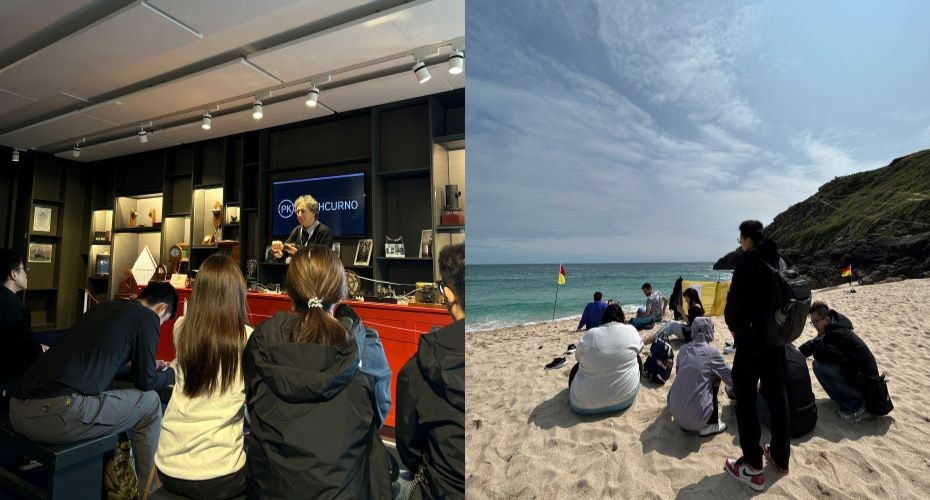Hi, I’m Giang Chu, an MSc student in Sustainable Business Management at the University of Exeter’s Penryn Campus in Cornwall, originally from Vietnam. When I first told my parents that I wanted to pursue a postgraduate degree in the UK, their immediate concern was whether it would truly be worth the cost. Even though I was fortunate to receive the Exeter Excellence Scholarship, which helped reduce the financial burden, there were still living expenses and other costs to think about. Like many families in Southeast Asia, mine viewed higher education as an important investment, but with the rising cost of living, they worried about whether a UK degree would provide value beyond just the certificate.
Now that I’m here, living and studying at Exeter, I’ve come to see that a degree is so much more than a piece of paper. It is about the skills you build, the hands-on experiences you gain, and the opportunities to grow as a person. In this blog, I want to share my own journey as an international postgraduate student, and how fieldwork, supportive academics, and life in Cornwall have helped me overcome my parents’ concerns and discover the real value of my degree.
Learning beyond the classroom
One of the things that has impressed me most about studying at Exeter is how much the learning goes beyond the classroom. In my MSc Sustainable Business Management programme, sustainability is not just a theory we read about, it is something we actively test and apply. In modules like Business Transformation Case Study, we are encouraged to approach problems as consultants would, using real examples to challenge our thinking. I’ve really enjoyed this postgraduate style of teaching, with its mix of seminars, small-group workshops, and one-to-one supervisor support, because it has pushed me to connect academic concepts directly with practice.
In June 2025, we visited the Porthcurno Global Communications Museum as part of this module. The trip combined academic learning with exploration, as we spent the morning in the museum’s learning centre before exploring the exhibits and later walking down to Porthcurno Beach. It was fascinating to learn how global communications have evolved and to reflect on how these shifts continue to influence business transformation today.
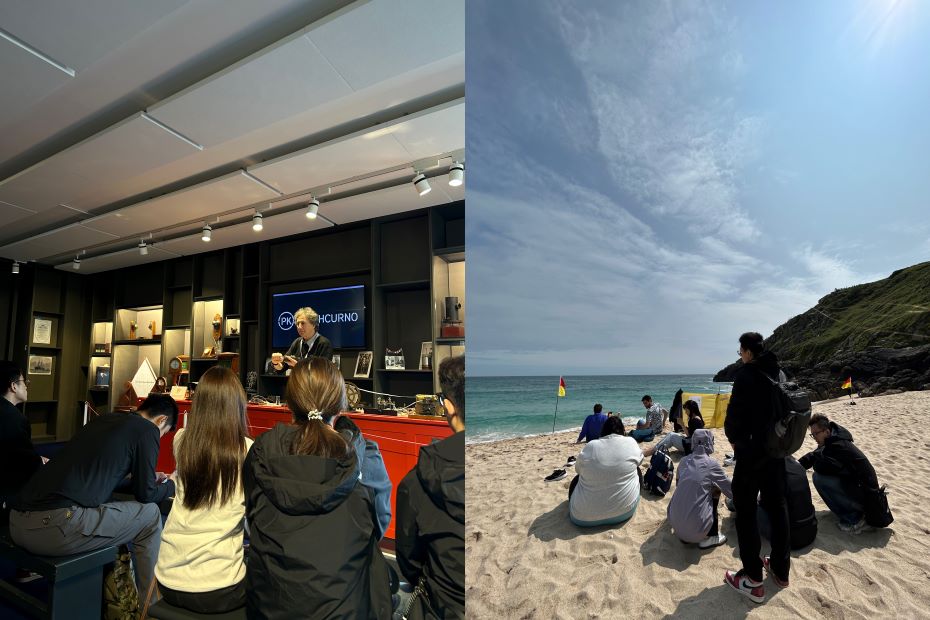
Another unique experience was our writing day for the dissertation module, in May, which was held at St Michaels Resort near Falmouth’s coast. Instead of being in a lecture theatre, we spent the day working on our Masters projects with guidance from the academic team. The atmosphere was both relaxed and inspiring. We had focused sessions on research methods and peer-to-peer discussions, and we also had the chance to clear our minds with short walks by the beach. It was the perfect reminder that dissertation writing does not have to feel isolating. At Exeter, even the most challenging parts of postgraduate study come with strong academic and community support.
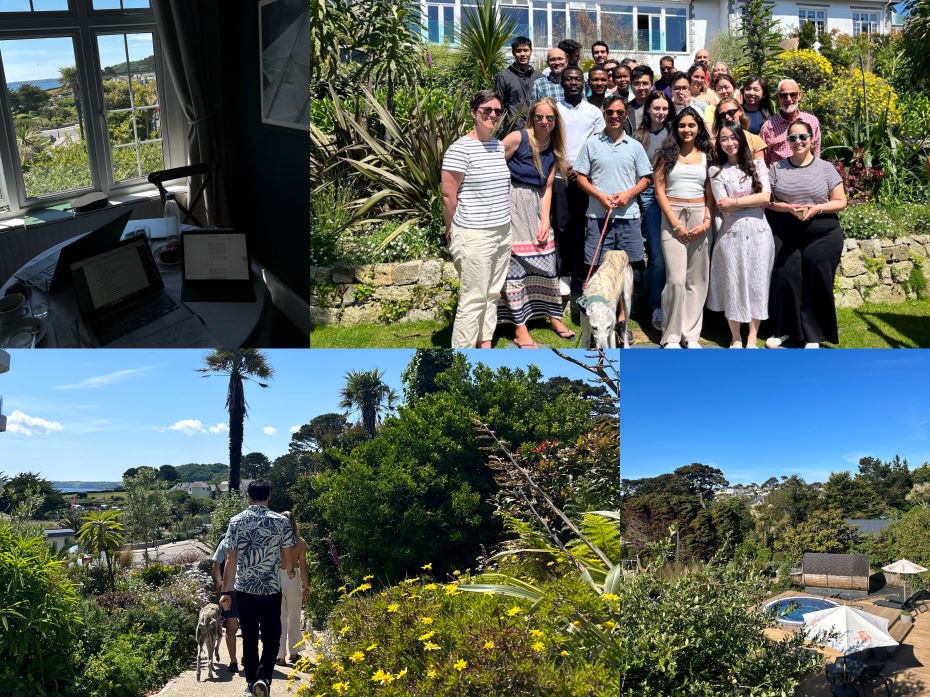
For me, these opportunities show how a degree at Exeter is not confined to lecture halls. The fieldwork and off-site learning days have been some of the most memorable parts of my postgraduate journey, giving me confidence, practical skills, and insights that I could never have gained from textbooks alone. They have also helped me develop transferable skills that will stay with me far beyond university. Group projects have strengthened my teamwork and cross-cultural communication, particularly when collaborating with classmates from many different countries. Writing assignments and my dissertation have sharpened my analytical and research skills. Presenting project findings in class has improved my spoken English and given me the confidence to explain complex ideas clearly. I still remember one presentation where our group had to deliver recommendations to lecturers acting as clients, which felt exactly like a real consultancy briefing. These experiences have shown me how academic learning can translate into professional skills that employers value.
Flexible degree options
Another part of my degree that I really value is the flexibility built into the programme. Although there are core modules that everyone studies, I have also been able to choose optional modules that reflect my own interests and career goals. For me, this meant focusing on areas of sustainability that I felt most passionate about and that I know will be useful for my future career.
At postgraduate level, the flexibility goes even further with the dissertation. Being able to design my own research project has allowed me to tailor it to the issues I care about most. My dissertation focuses on “Institutional Barriers to Justice-Based Climate Adaptation Governance”, which connects directly to both my academic background and the kind of policy work I hope to pursue after graduating. Having this level of choice makes the dissertation feel less like a requirement and more like an opportunity to specialise in something meaningful.
I know that for parents, especially those back home in Vietnam, it can feel daunting to invest in a degree without knowing exactly where it will lead. What reassures me is that this flexibility means I am not limited to one career path. Some students choose to stay in academia and continue their research with a PhD, while others move directly into professional roles such as sustainability consultants, analysts, or policy advisors. It’s a big benefit to have confidence that whatever direction I choose to take, the degree provides the skills and adaptability that employers and universities are looking for today.
Career support at Exeter
One of the reasons I chose Exeter was because of the strong focus on employability. The Career Zone has been an invaluable resource throughout my studies, especially as an international student. Coming from Vietnam, most of my previous work experience was based there, and I quickly realised that many UK companies look for candidates with local experience. At first, this felt like a disadvantage. However, through Career Zone workshops and one-to-one guidance, I learned how to highlight my international background as a strength and, more importantly, how to frame my academic work in the UK as practical experience.
For example, we are encouraged to treat our project-based consultancy work in modules as if it were professional experience. By learning how to present these projects on my CV and in interviews, I could demonstrate skills in research, teamwork, and delivering recommendations to real-world organisations. This has been a real game-changer for me, because it shows employers that I already have relevant UK-based experience, even while still studying.
We also have the chance to hear directly from guest speakers and sustainability-focused employers, who share their career journeys and insights into the sector. These sessions are not only inspiring but also practical, giving us a sense of the skills and qualities that organisations are really looking for.
A real highlight for me was being selected, together with two of my classmates, to attend the Anthropy event at the Eden Project earlier this year. It is known as one of the UK’s largest gatherings of future leaders, and for us it felt surreal to be part of it. Coming from Vietnam, I never imagined I would find myself in the same space as established professionals and policymakers, having conversations about the future of sustainability and leadership. It was also a chance to connect more deeply with my classmates as we shared this experience side by side. For me, it was one of those moments where I realised just how many doors a degree at Exeter can open, opportunities that go far beyond the classroom.
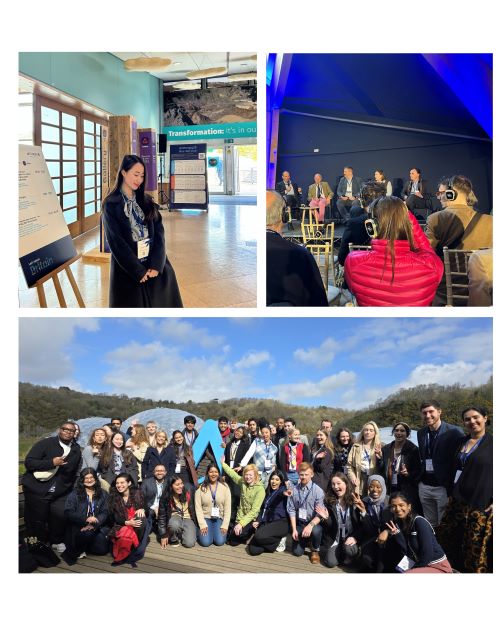
Travel and exploring Cornwall
One of the things I love most about studying at the Penryn Campus is its location. Penryn has a safe, small-town feel which I know is reassuring for my parents back home. It is easy to get around and feels very student-friendly, with everything you need within walking distance.
The campus is only minutes away from the sea, and I often spend time at nearby beaches like Gyllyngvase or Swanpool in Falmouth. Some of my happiest memories so far have been simple moments such as walking along the coast after class, watching the sunset with friends, or enjoying fish and chips by the harbour in Falmouth town. Cornwall itself is stunning, and studying here has given me the chance to explore hidden coves, coastal trails, and the unique charm of seaside villages.
Being in the UK has also made it easier to travel further afield. Last Christmas, I spent time in Edinburgh with friends from the Vietnamese Society, soaking up the festive atmosphere and enjoying the winter markets. Experiences like these remind me that university is not only about studying, but also about discovering new places and making memories along the way.
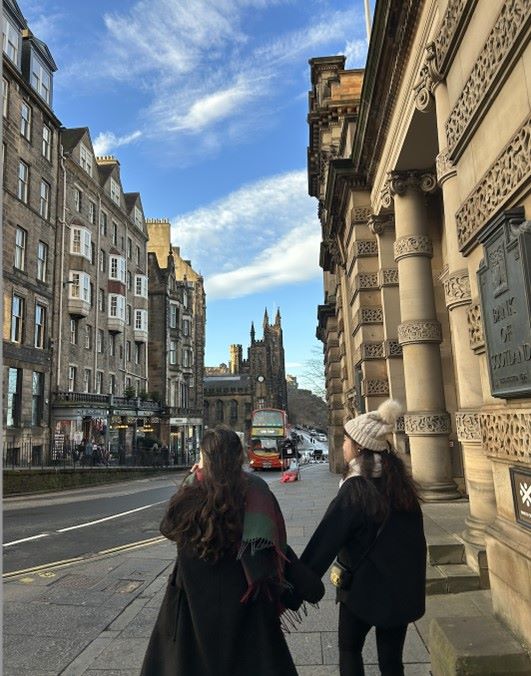
Personal growth as an international postgraduate student
Coming from Vietnam, where the academic system is often more rigid and structured, adjusting to the independent learning style at Exeter was a challenge at first. Postgraduate study here requires a lot of self-motivation and critical thinking, but over time I have come to appreciate how much it encourages independence. It has taught me to manage my own time, to think more creatively, and to take ownership of my learning. Living in a new country has also helped me grow in ways I never expected. I have become more resilient and adaptable, especially when facing situations outside my comfort zone. For example, during my first week in Cornwall I had to carry three large suitcases across train platforms on my own, and although it was stressful, I was surprised at how kind strangers stepped in to help. Another time, I got completely lost on a bus trip to Truro, but instead of panicking I asked the driver and some locals for directions, which gave me the confidence to reach out when I needed support.
Another important part of my growth has been building friendships and social confidence. In the beginning, I worried that making friends in a completely new environment would be difficult, but I was quickly proven wrong. My classmates come from all over the world, and through group projects, seminars, and late-night study sessions in the library we have become close. Some of my happiest moments have been the simple ones, like cooking Vietnamese meals in our flat and watching my friends try phở for the first time, or heading out together to explore the Cornish coast after class. Last Christmas, I even travelled to Edinburgh with friends from my course. We wandered through the Christmas markets, shared traditional food, and laughed about how different the Scottish winter felt compared to home. These experiences helped me feel at home in the UK, and they gave me the confidence to reach out, connect with people from different cultures, and form friendships that I know will last long after graduation.
These experiences have not only given me a support system but also helped me grow in confidence. I feel more comfortable speaking up in group discussions, reaching out to new people, and saying yes to opportunities. The friendships I have made here feel like they will last a lifetime, and I know many of these classmates will one day be professional contacts working on sustainability challenges across the world.
In many Southeast Asian cultures, independence and self-reliance are highly valued, and I feel proud that studying at Exeter has helped me grow in exactly these areas. I know that these lessons will stay with me long after I graduate.
For parents and families
When I look back, I understand why my parents were so concerned before I came to Exeter. The cost of studying abroad is significant, and they wanted to be sure that it would all be worth it. Now, after my experiences here, I can confidently say that it has been.
The value of a degree at Exeter is not just in the qualification, but in the opportunities that come with it: career support, fieldwork, inspiring academics, and the chance to build a global network of friends and colleagues. Even with the cost of living, I feel that the return on investment is more than financial. It is the personal growth, the resilience, and the confidence I have gained that make the experience truly valuable.
If I could give advice to other Southeast Asian parents, I would say that investing in a degree is about more than preparing your child for a job. It is about preparing them for life. A university like Exeter provides not only the knowledge and skills needed for a career, but also the independence, adaptability, and perspective that will help students thrive wherever they go next.
Final thoughts
Looking back, I can see that my parents’ concerns were completely understandable. Studying abroad is a big investment, and it is natural to wonder whether it will be worth it. For me, the answer has been yes in more ways than I imagined. My degree at Exeter has given me knowledge, practical skills, confidence, and experiences that go far beyond the classroom.
The value of a degree is not only in the certificate you receive at graduation, but in the opportunities you take along the way: the people you meet, the memories you make, and the independence you gain. If you are considering Exeter, I would encourage you to see it not just as a place to study, but as a place where you can grow, explore, and truly transform.

